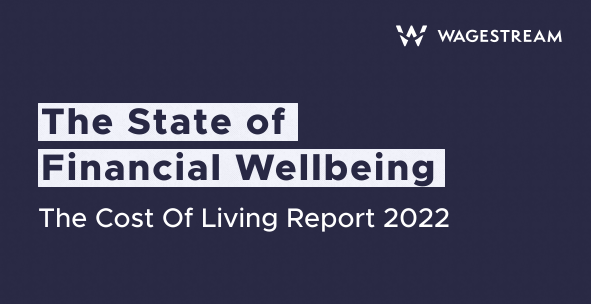The impact of the Cost of Living Crisis on UK workers has been revealed for the first time, with new data showing financial health, mental health and trust in employers have dipped dramatically since the crisis began. The findings see experts now calling on employers and government to act urgently with further measures to reverse the trend – from support packages in the short-term, to improving workers’ rights and support structure in the long-term.
Compiled by financial wellbeing experts Wagestream, the latest State of Financial Wellbeing report benchmarks almost 10,000 Brits’ financial and mental health between the end of 2021 and the summer of 2022, along with the views of almost 1,000 UK employers. The research paints a picture of a UK workforce on the edge: a vast majority (96%) of workers say their living costs have noticeably risen, and most (70%) are now worrying more about money – with 76% of them citing declining mental health as a result.
Worries over finances are now pervasive, with 72% consumed by money worries at least once a week – an increase from 57% before the crisis began. Overall, more than half (52%) say money is worrying them more than anything else; working Brits are taking action, with 70% already cutting back on spending, 39% reducing the amount they save and almost one in ten (7%) even cutting back on their pension contributions.
As workers adjust to a new economic reality, the report also cites quality and security of work as a key contributing factor to their declining health. Ben Harrison, Director for The Work Foundation at Lancaster University, explains:
“While millions more people may be in employment, the quality and security of jobs they are in often means they are unable to make ends meet. It will be acutely worse for the six million people in the UK who are in severely insecure work, and already face low pay and uncertain hours.”
There are positive signs that organisations are stepping up efforts to help: 80% of UK employers say they have introduced new financial support since the beginning of the year, for example. Yet, a reaction and impact gap seems to be widening – with just 19% of their employees being aware of this.
The latest benchmark also reveals a growth in employer misconceptions around employee money worries. HR professionals estimated, for instance, that just 3% of their employees worried on a daily basis about money (up from 2% in March). The reality is that 28% worry daily about it – a rise from 24% in March.
On the role of employers during the Cost of Living Crisis, Sarah Porretta – Propositions, Insights and External Engagement Director at the Money and Pensions Service, said:
“It’s vital that many more employers respond positively to these findings, by seeking ways to close the gap between their employees’ need for better financial wellbeing support in the workplace, and employers’ perception of what these needs are.”
That gap between need and perception has led to a dramatic decline in trust towards employers, according to the latest State of Financial Wellbeing snapshot. Previously, 52% thought their employer cared about their financial health and 22% did not. These figures now stand at 30% and 35% respectively. Revealingly though, when employees do notice new support, they strongly approve and are more than five times more likely to report that their employer cares about their financial wellbeing.
Jamie Lawrence, author of the report and Insights Director at Wagestream, suggests that employers can start by building bridges with their people on financial issues:
“Money stigma is massively compounding financial stress, throughout this crisis. Of those struggling, 76% have not approached their employer for help – with almost a third citing shame and embarrassment. Along with better communicating benefits and putting savings tools in place, HR teams can create real, instant impact by tackling money stigma – from thinking carefully about using non-judgemental language, to sharing accessible, meaningful stories that make the topic feel real and approachable.”
